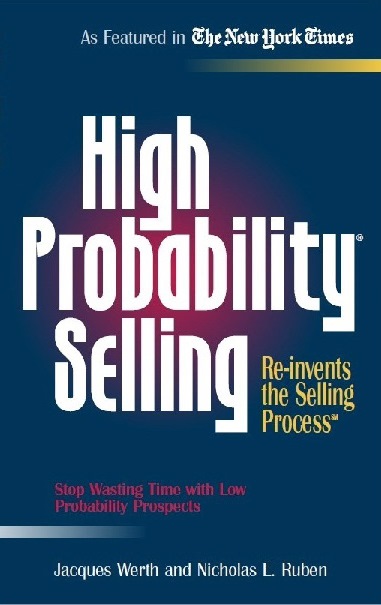
So You’ve Read the Book – Now What?
If you have any questions about High Probability Selling, we are having a live and interactive video meeting on Zoom
Here are some questions and comments submitted by students who were just beginning to learn High Probability Selling (HPS), plus responses provided by me (Carl Ingalls).
Syd: The scenario is scripted and far from real life (in my experience).
Me: Yes, it reads like a script. And yes, the scenario is far from real life in most people’s experience. Some people want that, and some do not. Some people want something that is very different from their experience. Others want something that fits in with what they have already learned. High Probability Selling can seem strange and unrealistic to someone who is used to thinking of “selling” as something you do for the purpose of getting people to buy.
Syd: Prospects do not have this much time to talk about their personal lives.
Me: It depends on how you interact with them.
Magdalena: What about “transferability” of the methods of HPS to situations where “selling” is not the main part of the job?
Me: If you see “selling” as getting someone to buy from you, then HPS does not apply at all. If you see “selling” in a much broader sense, where you include interactions where money is not involved, then HPS ideals and methods can be applied in almost every situation where you want to work with people.
James: Have you any experience of a trained telemarketer doing this for the salesman or does it have to be done by the individual themselves?
Me: Several companies use trained telemarketers to find high probability prospects, and make appointments that salespeople go on. It can work very well when the prospector and the salesperson use compatible methods. It can also work quite terribly when they don’t.
Jimmy: I have to talk to Managers, Engineers and Supervisors in the Mechanical Maintenance Department. How do I get their names?
Me: If you “have to” do this because it is a necessary part of the sales process you use, and it is not working well enough, then a different sales process may work better for you.
Jimmy: Salesmen are usually “yesmen”. What happens when the prospects are asked tough questions; it could be something new to them?
Me: There are a lot of yes-men, and they don’t get much respect. Salespeople who act with self-respect do. This can be a novel experience for a prospect. Very few will comment on it, especially if done in a neutral, matter-of-fact manner. If they try to “test” you, they might say something.
Jimmy: What to do, if the answer to any question is No or Evasive during the process. Do you walk away if the answer is an not an emphatic Yes?
Me: It depends on the question, and where in the process. If they say “no” to the prospecting offer, then we say, “Ok. … Goodbye”, and call them some other time. If the “No” means that the prospect is not a High Probability Prospect, then we walk away (for now). When we can’t tell, we find out by asking very direct questions. Continued evasiveness is also a pretty clear signal that it’s time to leave. If we do not get a “Yes” to the important questions, we walk away. However, we teach our students to go light on the disqualification until they get more experience, but always ask the questions.
David: What’s the definitive answer to dealing with leaving voicemails?
Me: Leave a voicemail whenever possible, and make it very short. Include a call-back number. If you do get a return call, treat it like an inbound prospecting call.
David: What if the prospect asks for further information via email before deciding if it is something they want?
Me: If requested, send information by email. Make sure that you have composed the email in advance, and that it was created specifically to go with that prospecting offer. Don’t try to get away with a general pitch.
David: What could be some red flags?
Me: There are several. Voicemail must be very short, probably shorter than the prospecting offer itself. If you send an email, never ever mention the fact that you did so, unless the recipient brings it up first.
Michael: Regarding “your procedure for a purchase order” if I am meeting with a married couple at their home, should I rephrase the question for individuals and not a company?
Me: Each of the questions in the Discovery Disqualification list can (and should) be reworded so that they apply to the specific prospect you are talking with.
Michael: Should I ask for the client’s list of conditions of satisfaction after question 13 and before question 14?
Me: We never ask the potential client to give us a list of their Conditions of Satisfaction. They probably could not put them all into words. That’s why we use that phrase. It is a lot more than just a list of known requirements.
You are welcome to ask more questions about HPS, and I will do my best to answer.

If you have any questions about High Probability Selling, we are having a live and interactive video meeting on Zoom
Ultimately, staying in the game is the deepest Why behind our decisions. When examining how we make our decisions, we
Take the first step toward mastering a proven sales system that works. Whether you’re just starting with the High Probability Selling book or looking for advanced training and coaching, we have the tools to help you succeed. Explore our resources and begin transforming the way you sell—consistently and confidently.